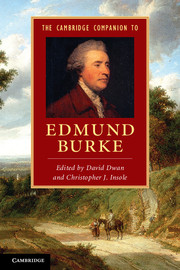Book contents
- Frontmatter
- Contents
- Contributors
- Acknowledgements
- Method of Citation
- Chronology
- Introduction Philosophy in Action
- 1 Burke’s Life
- 2 Burke, Enlightenment and Romanticism
- 3 Burke as Rhetorician and Orator
- 4 Burke’s Aesthetic Psychology
- 5 Burke on Law and Legal Theory
- 6 Burke on Political Economy
- 7 Burke and Religion
- 8 Burke and the Constitution
- 9 Burke and the Natural Law
- 10 Burke and Utility
- 11 Burke and the Ends of Empire
- 12 Burke and the American Crisis
- 13 Burke on India
- 14 Burke and Ireland
- 15 Reflections on the Revolution in France
- 16 Burke’s Counter-Revolutionary Writings
- 17 Burke in the United States
- Further Reading
- Index
- References
15 - Reflections on the Revolution in France
Published online by Cambridge University Press: 05 December 2012
- Frontmatter
- Contents
- Contributors
- Acknowledgements
- Method of Citation
- Chronology
- Introduction Philosophy in Action
- 1 Burke’s Life
- 2 Burke, Enlightenment and Romanticism
- 3 Burke as Rhetorician and Orator
- 4 Burke’s Aesthetic Psychology
- 5 Burke on Law and Legal Theory
- 6 Burke on Political Economy
- 7 Burke and Religion
- 8 Burke and the Constitution
- 9 Burke and the Natural Law
- 10 Burke and Utility
- 11 Burke and the Ends of Empire
- 12 Burke and the American Crisis
- 13 Burke on India
- 14 Burke and Ireland
- 15 Reflections on the Revolution in France
- 16 Burke’s Counter-Revolutionary Writings
- 17 Burke in the United States
- Further Reading
- Index
- References
Summary
Context, Origins, and Publication
Reflections on the Revolution in France was by far the most famous literary response to that liminal event of political modernity. It has often since been held to define and shape the conservative alternative to revolutionary principles. It purports to be a letter explaining, to a Frenchman, the author’s views on the Revolution and distinguishing between what we would today call the political cultures of Britain and of revolutionary France. The epistolary device – widely used by Burke – had a basis in fact. Charles-Jean-Francois Depont, a young French acquaintance, had written asking Burke for assurance that the French were, ‘worthy to be free, could distinguish between liberty and licence, and between legitimate government and despotic power’ (C, VI: 32). Burke’s initial reply, expressing grave misgivings about the Revolution, had been withheld, lest it compromise Depont, in favour of a brief noncommittal response, now lost. The opening of Reflections refers both to Depont’s second letter pressing Burke for a reply and to the withheld letter, which had finally been sent. However, although Burke presents Depont’s letter as the occasion for writing Reflections, it would be naïve to see it only in this way, or indeed, addressed only to the French.
Coincidently, on 4 November, the date of Depont’s first letter, another event contributed decisively to the nature of Reflections, shaping its opening passages and rendering the English its real target audience (as Burke would put it in a letter: ‘my Object was not France, in the first instance, but this Country’ [C, VI: 141]). This was the address (Burke provocatively calls it a ‘sermon’) given by Rev. Richard Price to the dinner of the ‘Revolution Society’, an association of dissenting ministers meeting annually to celebrate the Revolution of 1688.
- Type
- Chapter
- Information
- The Cambridge Companion to Edmund Burke , pp. 195 - 208Publisher: Cambridge University PressPrint publication year: 2012
References
- 6
- Cited by

